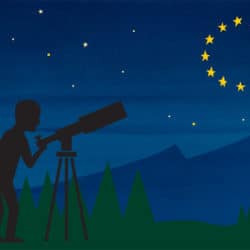Over the last several weeks, The Circle on Philanthropy and Aboriginal Peoples in Canada (The Circle) has been working alongside Canada’s philanthropic community on a national campaign to encourage individuals and organizations to learn, acknowledge, and understand more about truth and reconciliation. The Circle understands reconciliation as an “actioning” word, a verb that calls us to engage.
The Communications Affinity Group, a new network of communications professionals working in Canadian foundations, launched this collaborative, co-created campaign. The group understood the value of The Philanthropic Community’s Declaration of Action and its potential to transform the way philanthropy works, especially in relation to reconciliation. We have shared stories, ideas, and examples of reconciliation in action to highlight the many ways we can be involved in building a stronger, more inclusive country.
On February 16, 240 people registered to take part in The Circle’s webinar, Pens to Paper, Words to Action: Activating The Philanthropic Communities First Step from Truth to Reconciliation. A panel of leaders spoke of the experiences that sparked The Declaration of Action and emphasized the need for this document to go beyond words and live within our organizations’ missions, interactions, and cultures.
One example of putting words to action is Omar Karim’s vision and approach in hosting The 2017 MBA Games (MBA students from universities across Canada gather annually to take part in academic, spirit, and athletic competitions). Karim was the Chair of Vancouver Island University’s (VIU’s) MBA Games Organizing Committee for the MBA Games 2017, which took place in Nanaimo in January 2017. The Nanaimo campus of VIU and the City of Nanaimo reside on the traditional territory of Snuneymuxw First Nation.
The Circle recently spoke with Karim to learn more about his experience.
The Circle: Tell us about the event
Omar Karim: The MBA Games Organizing Committee consisted of 15 leaders, including VIU MBA students, business students, and graduates. Over this past year, our team worked to host both the BC MBA Games 2016 and the National MBA Games 2017. VIU placed first in the BC MBA Games in 2015 and won the bid to host the national event in 2017.
The National MBA Games is an annual gathering of more than 500 MBA candidates across Canada. This energetic week is the largest annual gathering of MBA students across Canada, where MBA students from across the country participated with integrity in academic, athletic and spirit competitions, showcasing their abilities and ambition. VIU was proud to bring the MBA Games to Nanaimo in January 2017, the first time in 30 years the games were held on the West Coast of Canada.
The success of the MBA Games 2017 created an opportunity to learn about and act on the recommendations of the Truth and Reconciliation Commission of Canada and the UN Declaration on the Rights of Indigenous Peoples.
The theme of the event was “Today for Tomorrow” – the decisions that we as business leaders make today will have a sustainable impact on the future of tomorrow. Our charity partner for the National MBA Games was the Moose Hide Campaign, a nation-wide grassroots movement to prevent violence against Indigenous and non-Indigenous women and children. All funds raised during the Games are going to be used to launch a new national initiative titled “Safe Space, Safe Place.” The goal of this initiative is to protect and prevent violence against women on university campuses across Canada, and to build conversations around mutual understanding and respect for Indigenous communities.
Overall, the MBA Games 2017 raised $300,000 – including matching funds from the J.W. McConnell Family Foundation. This was an all-time MBA Games fundraising record.
What does Reconciliation and The Declaration of Action mean to you?
Reconciliation to me starts first with the individual. It is important for leaders across the country to learn and to understand the significance of this concept in the context of their upbringing and societal surroundings. When one understands how to reconcile with themselves, it allows the individual to build a sense of self-awareness and strength to absorb the history of the people who make this land so special. Reconciliation means to acknowledge and to recognize the traditional territories on which we stand. It’s about acknowledging our history and building together towards a prosperous future where all peoples are treated with respect. The Declaration of Action paves the way for one to learn or to find the path of reflection that allows them to reconcile with themselves. It is vital to learn, to understand, and to participate in order to accept our differences, learn from each other, create positive relationships between communities, and build upon these relationships to impact and inspire those around us.
How did working with The Declaration affect the dynamics and culture of your team?
The National MBA Games 2017 worked in collaboration with The Circle on Philanthropy and Aboriginal Peoples to connect to the themes of the Declaration of Action in order to foster stronger relationships between Indigenous peoples and all Canadians. The Declaration of Action was used as a guiding principle throughout the MBA Games 2017 events.
When we won the bid to host National MBA Games, we realized that January 2, 2017 marked a remarkable moment in our country’s history – it commenced the year that marks the 150th anniversary of Canada since Confederation. The organizing committee, inspired by values instilled by VIU, recognized this timing as an opportunity to raise awareness of the recommendations of the Truth and Reconciliation Commission and the UN Declaration of Human Rights of Indigenous Peoples.
The Declaration of Action positively affected our team’s dynamic and culture and inspired us to develop values of mutual understanding and respect. In addition, it mapped out our path of reflection to prepare us to lead MBA students across the country with a strong understanding of First Nations people, appropriate protocols, and ways of culture. The MBA Games’ Organizing Committee used the Declaration of Action as a mechanism to guide the MBA delegates’ experience in preparing for Canada’s 150th anniversary.
The MBA Games challenged delegates to learn about stories of reconciliation, to share these stories with their classmates, friends, family, school programs, and alumni, and to mobilize their communities to protect and prevent violence towards women and children. Delegates were tasked to participate at the MBA Games by participating in sessions that drew upon our history, including the KAIROS Blanket session (a teaching tool to share the historic and contemporary relationship between Indigenous and non-Indigenous peoples in Canada).
The MBA Games Organizing Committee created an exhibit to showcase the work of the MBA delegates from 19 universities across Canada. The exhibit incorporated the themes of “To Learn, To Understand, and To Participate,” including the work and efforts of schools to reflect on the history of their respective traditional territories. The exhibit itself included the fundraising efforts completed by institutions for the Moose Hide Campaign.
What advice do you have for non-Indigenous people on how to engage and take on their role in Reconciliation?
Coming from a non-Indigenous background, I would advise others to first use the Declaration of Action as a guiding principle in their individual, community, or organization journey to understand the true importance of reconciliation. To me, reconciliation is a call for action, and it is extremely important for individuals to engage in conversations and to continue to have dialogue with open minds about Indigenous history and communities.
On a personal note, before I completed my MBA at VIU, I went to Simon Fraser University and the University of British Columbia. I was born and brought up in Vancouver as a Canadian Ismaili Muslim and I did not know much about the Indigenous community. I did not understand the history of injustice and struggle, and I did not know about reconciliation and the role that all of us have in making this a priority for all Canadians.
Once I arrived at VIU – a values-based institution that places relationships and respect for Indigenous knowledges and peoples at its core – my journey of understanding began. VIU is recognized nationally for its leadership in building relationships and reciprocal partnerships with Indigenous peoples. I learned this as I became interested in protocols and understanding the acknowledgement of traditional territories that took place at every VIU event: from sessions facilitated by local chiefs at Shq’apthut, VIU’s Aboriginal Gathering Place, to resources that were available to students.
If we could leave Canadians and non-Indigenous members across Canada with one take-away message in engaging in reconciliation, that would be “Today for Tomorrow.” We often reflect on words from former Chief of the Assembly of First Nations Chief Shawn A-in-chut Atleo, who currently holds the role of Shqwi’qwal [pronounced sh-qwee-qwal] or Speaker of Indigenous dialogue, a role housed at VIU. He often speaks about how, in the past, education has been used as a tool of oppression towards Canada’s Indigenous peoples, and how today it can – and must – be used as a tool of emancipation and empowerment.
This ties into the idea of how the TRC indicated that educational institutions and business organizations have a responsibility to take the lead in reconciliation – education is a powerful tool and it must be used appropriately. As we have seen, it is easy to use it as a tool of oppression. We now must change that around and use it as a tool to build relationships, to better understand our past, to have challenging conversations that explore complex topics such as reconciliation, and to participate – as the MBA Games challenged people to do through the Moose Hide campaign. Education is critical to the process of reconciliation.
Tell us about your experience working with The Circle
It has been an absolute pleasure to work with the The Circle on Philanthropy and Aboriginal Peoples in Canada. I have learned so much from members including Wanda Brascoupé Peters, Jennifer Brennan, and Shereen Munshi about how the Declaration of Action can become a reality in how we position our lives, our businesses, our government, and our communities in shaping our country’s future. This experience working with this organization and the Moose Hide Campaign has changed my life in the way I interact, think, acknowledge, respect, and engage with others. It has provided me with a wider perspective of Indigenous peoples in Canada and the important role that each of us has in making reconciliation a priority in university institutions, business environments, and community organizations. Events such as the MBA Games 2017 will encourage our commitment as future business leaders in Canada and around the world to work respectfully, authentically, and collaboratively with Indigenous people on this land where we all live, love, learn, and play.

